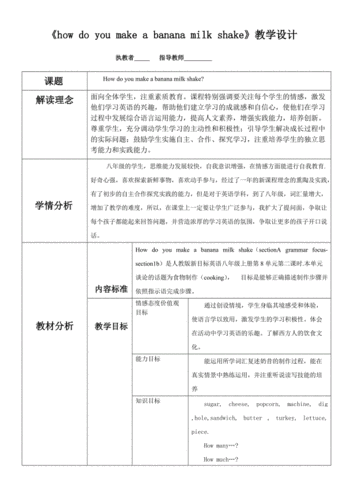**Title: Leisure English Poetry Appreciation Lesson Plan**
**Introduction:**
In this lesson plan, students will explore English poetry centered around the theme of leisure. Through analysis and discussion, they will enhance their understanding of poetic devices and literary techniques while also improving their language skills.
**Objectives:**
1. To introduce students to English poetry focused on the theme of leisure.
2. To analyze poetic devices and techniques used in selected poems.
3. To encourage critical thinking and discussion among students.
4. To enhance students' language proficiency through poetry appreciation.
**Materials Needed:**
1. Selected English poems on the theme of leisure.
2. Whiteboard and markers.
3. Handouts with selected poems.
4. Audio recordings of poems (optional).
5. Laptops/tablets for online research (optional).
**Procedure:**
**1. Introduction (10 minutes):**
- Begin the lesson by discussing the concept of leisure and its significance in literature.
- Introduce the objectives of the lesson and explain the importance of poetry appreciation in language learning.
**2. Warm-up Activity (15 minutes):**
- Engage students with a brief discussion on their favorite leisure activities.
- Ask students to brainstorm words or phrases associated with leisure on the whiteboard.
- Encourage students to express their thoughts and feelings about leisure in English.
**3. Poetry Analysis (40 minutes):**
- Provide handouts with selected poems related to leisure, such as "Leisure" by W.H. Davies and "The Road Not Taken" by Robert Frost.
- Guide students through a close reading of each poem, focusing on poetic devices such as imagery, metaphor, simile, and symbolism.
- Encourage students to identify the theme, tone, and mood of each poem.
- Discuss the cultural and historical context of the poems, if relevant.
- Play audio recordings of the poems to help students grasp the rhythm and tone (optional).
**4. Group Discussion (20 minutes):**
- Divide the class into small groups and assign each group a different poem to analyze.
- Encourage students to discuss their interpretations of the poem and share their insights with the class.
- Facilitate discussions by asking guiding questions, such as:
- What imagery does the poet use to convey the theme of leisure?
- How does the structure of the poem contribute to its meaning?
- What emotions does the poem evoke in you?
**5. Creative Activity (20 minutes):**
- Instruct students to write their own short poems inspired by the theme of leisure.
- Encourage creativity and experimentation with language.
- Allow students to share their poems with the class if time permits.
**6. Reflection and Closure (15 minutes):**
- Lead a brief reflection session where students can express their thoughts on the lesson.
- Summarize key takeaways from the poetry analysis and discussions.
- Encourage students to continue exploring English poetry in their free time.
**Assessment:**
- Assess students' understanding through participation in discussions, analysis of poems, and creativity in the writing activity.
- Provide feedback on students' comprehension of poetic devices and their ability to express ideas effectively in English.
**Homework:**
- Assign students to choose a poem related to leisure from a provided list or of their own choice.
- Ask students to write a short essay analyzing the poem's themes, poetic techniques, and personal interpretation.
By engaging students in the appreciation and analysis of English poetry on the theme of leisure, this lesson plan aims to foster a deeper understanding of both language and literature. Through thoughtful exploration and discussion, students will develop their analytical skills, language proficiency, and appreciation for the beauty of poetry.

免责声明:本网站部分内容由用户自行上传,若侵犯了您的权益,请联系我们处理,谢谢!联系QQ:2760375052









